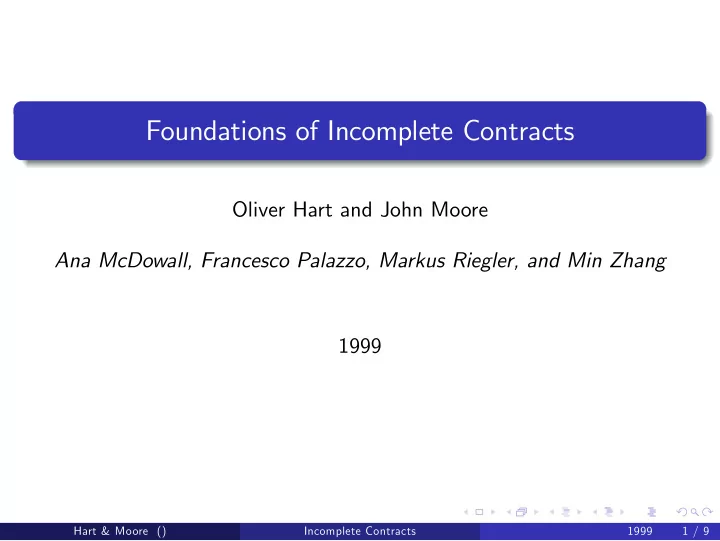

Foundations of Incomplete Contracts Oliver Hart and John Moore Ana McDowall, Francesco Palazzo, Markus Riegler, and Min Zhang 1999 Hart & Moore () Incomplete Contracts 1999 1 / 9
Why do we use incomplete contracts? Early literature: incomplete contracts generated by non-describability Maskin & Tirole (MT): Irrelevance theorems - optimal contract is same under describability (D) and non-describability (ND) Hart & Moore (HM): the conditions for MT theorems are restrictive, when relaxed D or ND matters This paper illustrates when MT results apply and where they break down Hart & Moore () Incomplete Contracts 1999 2 / 9
A model of incomplete contracts N widgets can be traded, one is “special” - want to trade it value v to buyer (B) cost to seller (S) c = c 1 with probability π ( σ ) , c = c 2 otherwise ( v > c 2 > c 1 ) At date 1 / 2, S chooses investment σ , π � ( σ ) > 0, π �� ( σ ) < 0 N − 1 generic widgets, costs g n = c 1 + n N ( c 2 − c 1 ) , n = 1 , . . . N − 1 Hart & Moore () Incomplete Contracts 1999 3 / 9
Possible contracts First best: max π ( σ ) ( c 2 − c 1 ) − σ Cannot contract on investment σ Outcome Commitment No Commitment Describable first best (approx.) null contract Non-describable first best (approx.) null contract Hart & Moore () Incomplete Contracts 1999 4 / 9
Commitment Theorem Suppose case ND holds. If the parties can commit not to renegotiate, then the first best can be achieved. Implementation of the first best: give S the right to make a take-it-or-leave-it offer to B at date 1. S gets the whole surplus at date 1 ⇒ chooses efficient σ Describability not needed Hart & Moore () Incomplete Contracts 1999 5 / 9
No Commitment Theorem Suppose case D holds. If there is no commitment, then irrespective of the contract, as the number of widgets N tends to infinity, S’s investment σ approaches 0. That is, in the limit contracts cannot make any difference to expected total surplus and the parties may as well use the null contract. Example for finite N , assuming B has all the bargaining power in renegotiations: date 0 contract specifies that S must provide a widget at date 1, which he may choose hence, S wants to provide cheapest widget if c = c 1 special widget provided if c = c 2 S wants to provide cheapest generic widget (which costs c 1 + 1 N ( c 2 − c 1 ) ); B offers N − 1 ( c 2 − c 1 ) to trade special widget N S’s gain from state 1 is 1 N ( c 2 − c 1 ) (incentive to invest tends to 0 as N → ∞ ) Hart & Moore () Incomplete Contracts 1999 6 / 9
Does describability matter? MT prove the Irrelevance theorem for: commitment case no commitment + “maximality” + “renegotiation welfare neutrality” HM argue that these assumptions might be too restrictive and provide plausible examples D � = ND Hart & Moore () Incomplete Contracts 1999 7 / 9
Can we assume renegotiation welfare neutrality? In many cases, no. What happens then to our theorem? Counter-example to irrelevance: Suppose that the special widget is known at date 0 and the costs of generic widgets known Case D - optimal contract is agree to trade special widget at fixed price irrespective of c . S has first best incentives Case ND - isomorphic to no commitment, full uncertainty problem Nondescribability is generally an important constraint in the absence of commitment to not renegotiate Hart & Moore () Incomplete Contracts 1999 8 / 9
Commitment Can we implement commitment? Use an irrevocability clause Use a third party: B and S must pay huge fine if renegotiate Can we improve outcomes under no commitment? Use a third party to penalise B without rewarding S which improves incentives Can also achieve this through a lottery instead of a fine if B is risk averse A reallocation of property rights can help when contracts are incomplete Hart & Moore () Incomplete Contracts 1999 9 / 9
Recommend
More recommend